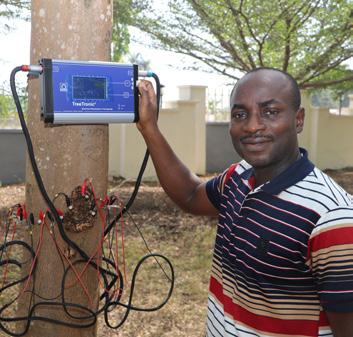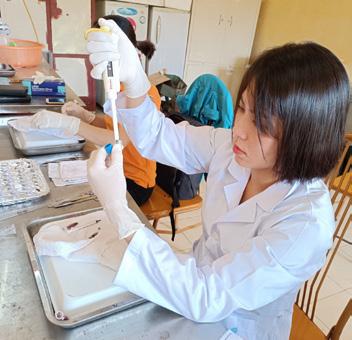
3 minute read
Summary
by IFS
A New Strategy and Looking Ahead
Under the theme of Investing in Future Scientists, 2022 was the next step in our Strategy for 2021–2030, which:
> Represents an evolution in our approach to enhancing research capacity
> Reflects changes in the contemporary context
> Focuses resources on supporting promising early-career scientists, and
> Provides a foundation for IFS to move onto its next chapter.
In November 2021, IFS commissioned Nairobi-based ECIAfrica to conduct an Assessment on IFS’s Next Chapter. The Assessment made specific recommendations on developing a programme that better supports early-career scientists in the Global South in line with specific requirements and expectations of partner institutions and scientists, and with evolving donor thinking. Overall recommendations included: a) Clarifying IFS programme content and boundaries in terms of focal thematic areas b)Anchoring mentorship as part of IFS’s delivery approach c) Enhancing attention to climate change d)Reengineering the IFS learning processes to reflect the realities of today e) Establishing a robust monitoring, evaluation, accountability and learning framework, and f) Redefining IFS from just grantmaking to a change-making organization.
In November 2022, IFS held its 50th Anniversary Forum on Science for Peace, Prosperity and Justice. Among the day’s discussions, the wide-ranging representation of IFS constituencies highlighted:
> The unique culture and remit of IFS and its reputation in countries of the Global South
> Concerns about changing the nature and operations of IFS, and not losing its soul
> The hope that IFS continues to be inclusive, with its support to women in science, and now with the possibilities of working with indigenous peoples and local community organisations, and
> How IFS will still be helping to create the best science possible by embracing working with indigenous peoples and knowledge and with local communities.
In this year’s Annual Report, we present our work in 2022 so that the impact of how grantees’ research is put into use is at the forefront, followed by our grants provision and capacityenhancing support activities, as follows.
Impact
We supported and followed up with 196 grantees of 2018 who were finishing their research. Through a representative selection of research results and achievements of grantees, IFS has documented evidence of numerous impacts from its support for the research of early-career scientists. So far, these scientists have published 180 articles in peer-reviewed scientific journals and established numerous national and international scientific contacts. Of the 117 grantees who submitted their Project Completion Forms, all but two were still active in research and 109 were still working in their own countries. IFS grantees are using their research in immediate, near-term and long-lasting ways, in communities, villages, forests, fields, policy discussions, government practices and the global scientific community. For example, impact has been demonstrated through:
> Careers being launched
> Useful research coming from relatively small grants
> Peer-reviewed scientific publications and other media products resulting from research
> Women scientists succeeding at high rates
> Graduates and postgraduates returning to a science community in their home countries
> Successful alumni associating in support of each other and younger colleagues
> Like-minded scientists participating in disciplinary and interdisciplinary networks
> Scientists in less-resourced countries having access to a source of funding
> Influential individuals who acknowledge the support of IFS in developing their careers
> Scientists working and researching together across continents and building strong, lasting scientific relationships, and
> Building institutional capacity.
Grants
In 2022 we attracted 473 completed applications for Basic Grants. Out of the total proposed projects, 137 grants were approved for funding, with women scientists accounting for 27% of the individual research grant awardees. In addition to the early-career scientists receiving research grants, the other 335 applicants were also given feedback by well-qualified
IFS reviewers and advisors as part of our capacity-enhancing activities. The IFS Secretariat also processed 55 purchase orders for laboratory equipment and materials.

The implementation of the new Advanced Grant scheme continued in 2022, through a collaboration with Philippinesbased SEARCA1 on a response to the COVID pandemic with a Call for Research on Accelerating Transformation through Agricultural Innovation in Southeast Asia. Ten successful applicants received an IFS-SEARCA Advanced Grant to conduct their research within one to three years.

Capacity-enhancing Support
In 2022, IFS jointly engaged with various strategic partners on a spectrum of topics, including pitching proposals, research writing in the sciences, statistical computing, women in STEM, crop protection, and gender equality in research. The eleven activities took place virtually, in person and in hybrid formats. In addition to mentoring and coaching the grantees from 2018, 468 grantees from other sessions with ongoing research projects received support whenever needed. We also supported our alumni to associate with and support other potential grantees through training and coaching.
Responding to COVID-affected Grantees
In 2022, the COVID pandemic continued to affect current IFS grantees and their ability to run their IFS grant projects according to plan. The main reported constraints related to delays due to local or national regulations limiting travel to the field or access to the laboratory, and increased costs, making it difficult to stay within the grant budget approved for the project.








